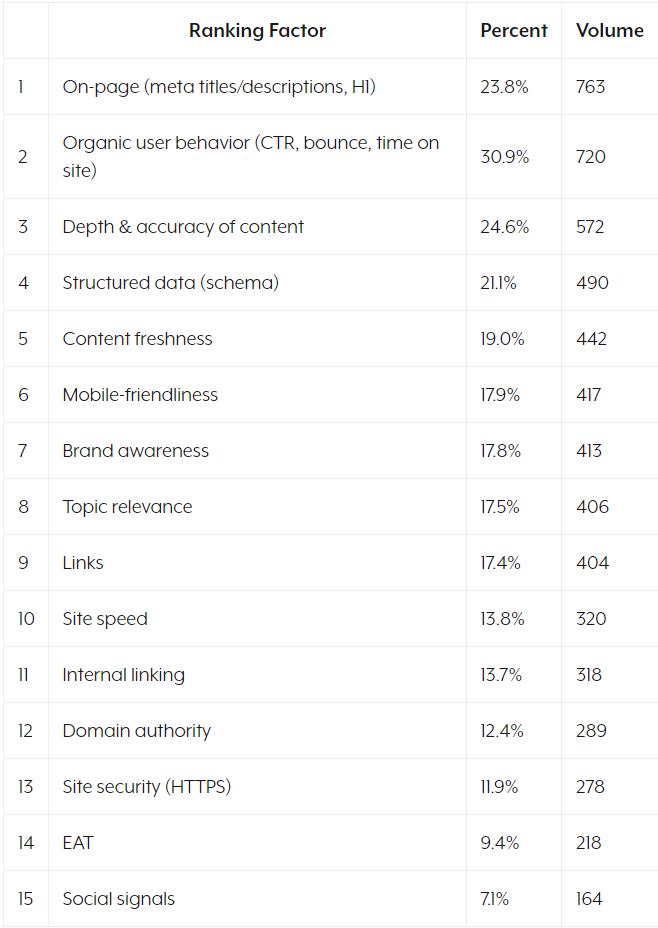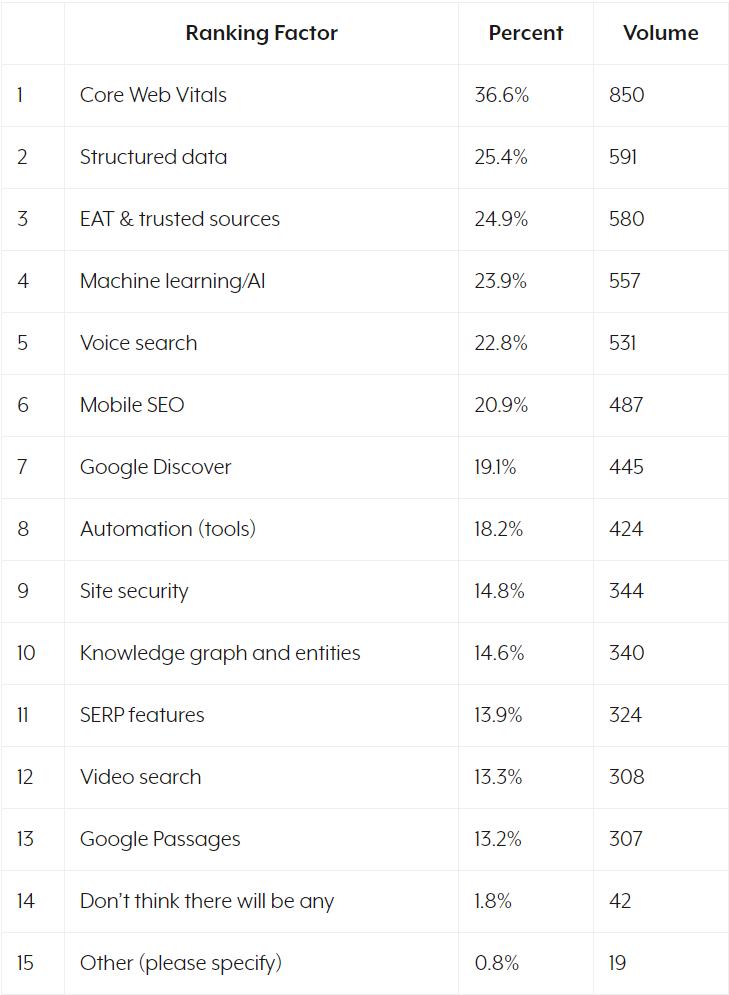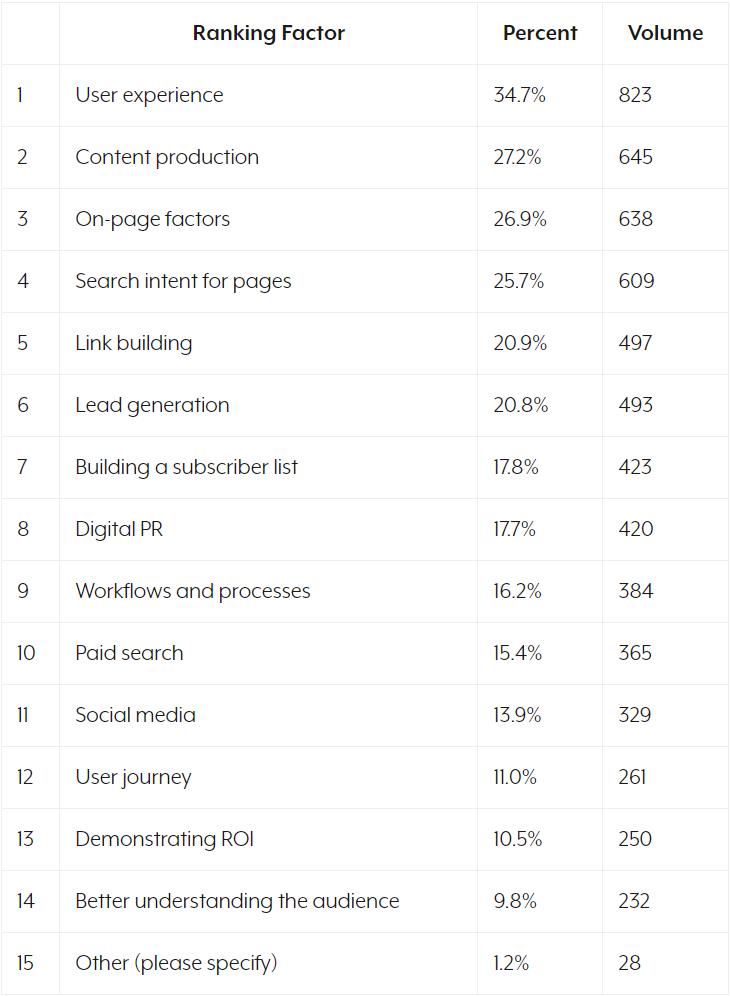The state of SEO: main trends and factors according to professionals
It is called The State of SEO 2021, and it is the big annual report published by Search Engine Journal to take stock of the health status of the search engine optimization work, thanks to guidance, opinions and insights from nearly three thousand professionals in the industry around the world, which allow us to outline the framework of SEO today, on current trends and the next possible developments.
One of the most interesting focus of this report is dedicated to the analysis of trends and optimization factors that are currently offering the best results: so let’s take a look together at the opinions of the great experts in the field and gather tips to optimize our strategies.
The state of SEO today and tips to optimize future strategies
What are the ranking factors that seem the most important at the moment to make the pages rank, what the main trends and signals emerging, and where to orient our optimization work for the next 12 months: these are just some of the questions asked to the SEO professionals involved by SEJ, which then reveals the main reflections on what contributes to the success of the SEO today and on what needs to be focused on in the immediate future so to consolidate results and overcome competition.
If it was fairly obvious that many would report Core Web Vitals as the most relevant emerging predominant factor that will impact on SEO, the study also reports very useful considerations on other aspects to pay attention to among the optimization interventions or in the different priorities between the B2B and B2C niches.
Ranking factors perceived as the most important
The ranking factors on Google and other search engines are a controversial issue, as Shelley Walsh also points out in a summary article, since there are different opinions about what affects the ranking and what does not, and the same studies that try to measure ranking factors are often criticized for their validity.
The point is to understand if the data that emerge are united by correlation or causality: in general, the first applies (there are some elements in common among the best placed content on Google, a sign that the search engine believes these are important features), while causality is more difficult to prove (that is, that those contents and those pages are well positioned precisely because they have used certain techniques and met certain criteria and best practices).
The opinion of SEO experts: these are the signals with the greatest impact on rankings
The report reports the answers of about 3000 SEO professionals compared to signals that, based on their experience, they think have had the greatest impact on ranking in the last 12 months.
As you can see from the table, interviewees continue to consider as more important ranking factors such as meta titles, descriptions and H1 on the page – exactly the elements at the center of the recent controversy with Google, after the Titlepocalypse and the introduction of a new system to generate page titles in SERP, which can change the title tag chosen by the site. Generally speaking, more than a third of experts are convinced that on-page factors are a priority in order to achieve results on search engines.
It is also interesting to read the motivations behind the answers. For example, Barry Adams, founder of Polemic Digital, believes the on-page is fundamental to SEO and says that “recently Google seems to rely less on off-page ranking signals (i.e links) and has placed more emphasis on relevance and content quality”. A perception shared by many, seeing that in the survey brand awareness was considered more important than links as a ranking factor!
Jamie Indigo of Deepcrawl, however, invites us not to underestimate the technical aspects, since “what is not rendered cannot be ranked: only if the site is properly indexed (and all pages that needs to be in the indexed are indeed indexed), then yes, it seems quite reasonable that the on-page factors are the most important ones”.
The central role of content
One expert out of three (31 per cent) places the emphasis on user behaviour and cites as priority factors such as the click rate (CTR), the bounce rate and the time on the site – which ability to influence the ranking therefore continue to create divided opinions – and just under a quarter of respondents felt that the depth and accuracy of the content made a difference to ranking.
According to Mindy Weinstein of Market Mindshift the “depth of content around a topic is a big problem: if you want to rank for a particular topic (e.g. keywords), you should provide detailed and relevant content to meet the query of the searcher, also respecting some technical factors such as speed, crawlability etc.”. She is echoed by Barry Adams, who considers the relevance absolutely crucial because “Google wants to rank the best answers for every question someone can type, so the content of a website must answer these questions in the best way possible”; in light of this, it argues that “rankings must be earned” and that one must change approach to the problem, “from how can I maximize my profit from Search to how can I best help my audience“.
Other factors deemed important
Structured data was the fourth most cited major factor in the survey, and Jamie Indigo shares the indication, since based on her experience “a strong semantic markup and ARIA attributes make a page easy to understand and even a well executed structured data markup does a lot” in order to get a good indexing, the very first step towards ranking.
More surprisingly, EAT was considered to be able to influence the ranking only by 9% of SEO professionals, despite the connection with the accuracy of the content and Google’s drive to push towards the recognizability of credible content makers.
As Izzi Smith of Ryte points out, however, not all the elements that lead a page to rank well are directly measurable, and in particular “relevance, user satisfaction, brand awareness, content uniqueness are much more important to achieve than an arbitrary classification factor”. In summary, “Google tries to offer the best possible resource for a query and I will always try to be that resource“, she says.
Another expert, Kevin Indig from Shopify, was surprised to see that a share of interviewees (about 7 percent) mentioned social signals as the most important classification factor, commenting that “Perhaps it is a sign that some beliefs are difficult to eradicate in the SEO”. For some time now, the impact of social media as a ranking factor has been questioned, even though we know that social media can help the SEO in many ways.
An eye to the future: ranking factors that will emerge in the next 2 years
The success of our optimization strategies depends not only on the ability to respond to what is now needed to compete, but also on the ability to glimpse possible developments in the search system.
Basically, a website has a chance to rank well if it offers valuable content for the user, meets their needs also providing good UX and ease of use, if it has a reliable brand: but this is not enough, also because there are (still) so many ways to fool search engines.
And so, to try and achieve prolonged visibility and a stable presence in the organic search, it is important to pay attention to what Google wants and quickly adapt to the new landings of the search engine. For instance, Google now increasingly relies on the user having the best experience possible, and most SEO trends are an extension of it.
It is not surprising, then, that most of those answering the survey defined the Core Web Vitals as “the most important emerging factor in the SEO” even if the opinions of professionals in the sector are still divided on the actual impact that these signals are having on the ranking and visibility of sites.
The comments of SEO professionals
Answers on the emerging factors have, however, baffled various commentators. For instance, Kevin Indig called it a “shock” to see CWVs in first place, also because “from experience and early analysis it is fair to say that there is no indicator that CWV even remotely has the same impact on the ranking content that links or even meta titles have”.
Core Web Vitals are also overrated according to Barry Adams, as they do not seem to “play such an important role as some might think” and “have caused a great outcry for minimal effect“. The expert also contests the mention of “voice search, which proved to be a flop and does not seem to have any impact on the way we do SEO”.
Slightly different the opinion of Izzi Smith, which instead considers the CWV a factor to pay attention to, especially for the implications they have in the user perspective: perhaps their “ranking impact will not be revolutionary, but the focus on website performance and user experience could be”. More generally, the expert needs a more holistic approach to SEO, leading to the development of “growth strategies and optimizations that consider the user experience and accessibility on the front line”.
Another emerging front are the EAT parameters: if they are indicated only by 9 percent as a central element today, a quarter of the experts consider them an area to keep an eye on for the growth of their projects.
That vision is endorsed by Barry Adams, according to whom “demonstrating your EAT as a website will continue to become increasingly important”; in the future “there will be several new ways in which websites can show their authority, which we as an industry have not yet considered, and individual skills and authorship are also interesting areas that will gain value” according to the expert.
According to the 21 percent of SEO professionals the emerging factor in the coming years will be mobile SEO, an area that according to Jamie Indigo will also be at the center of Google’s expansion, which “will continue to push for the next billion users”, trying to intercept “those users who use mid-range mobile devices that *cannot handle* the obscenely bulky scripts we send on every page”.
Therefore, in her view, the expert thinks that the real ranking factor will be to ensure that “real humans can really use this page”, by working on the technical aspects of the site to meet the requirements of Page Experience: “Although Google called it Mobile-First, the Mobile-only Index is coming; Googlebot inherits the basic requirements from its web rendering service, Chromium, and your site must meet these requirements, which have been deliciously packaged together for SEO as a Page Experience”.
From a different opinion comes Mindy Weinstein, who predicts “machine learning and artificial intelligence as one of the strongest factors in the coming years, which will affect many aspects of our work as SEO professionals, how to identify the search intent, determine relevant keywords and form an SEO content strategy”.
The SEO work areas for next year
The third question that can offer us some practical guidance concerns the areas on which SEO professionals expect to work in the next 12 months, which really makes us understand what operators in the sector devote attention and time to.
In light of the above answers, it was clear that the optimization of the user experience was at the top of the list, given the close relationship to Core Web Vitals and the Page Experience update. According to Kevin Indig, this is the right direction, because the UX “seems to have an increasing influence on the performance of organic search and conversions”.
More than a quarter of professionals will continue to focus on content production, reaffirming the domain of content marketing and contributing, in fact, to the progress of competition between pages (without considering that overproduction that is not supported by strategies on article quality is harmful to the site itself).
In a lot more of niche areas will focus the work of Izzi Smith and Jamie Indigo in the coming months.
Ryte’s expert reveals that she is committed to help “companies gather crucial topics into consistent UX strategies for websites and demonstrate how the SEO supports this”, and that she also intends to “spend more time on accessibility issues, as well as supporting companies in creating more sustainable and low-emission websites“. As for her, Jamie Indigo will continue her training on the Web rendering service by following Chromium updates and communities, and concludes her thoughts by saying she is sure that “the future of technical SEO will not be labeled as SEO”, but it will rather take a greater (and more specific) awareness.




